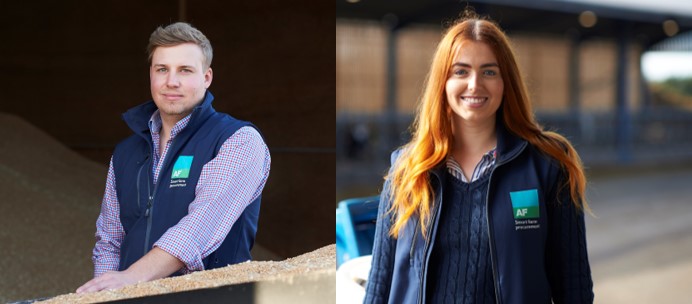Two of the younger members of AF, Frances Roberson and Lee Oxborough, share their take on age in farming.
Frances: When it comes to age in farming, we hear a lot of two things: how very old the average UK farmer is and how hard it is to attract young people to our sector.
Lee: We want to come at both these age-isms in agriculture from a different standpoint because we think that there’s positive power in mixing up the numbers and we can show you why.
Frances: We started by asking ourselves a question. How old are we at AF? We took guesses. 43? 58? The answer? It is 40 years old!
Lee: The youngest member is one of our Fuel Specialists.
The oldest members include Head of Marketing, a Key Accounts Manager and Sales Ledger Administrators. The whole business – and our farmer Members – benefit from the energy, skills sets and experience that come with old and young alike.
Frances: My role is Livestock Inputs Coordinator. The advantage of my youth is that I have many young contacts I liaise with to ensure that they have the inputs they require. My experience within the young farmers’ organisation also puts me in a unique position with lots of insights to the struggles that young people in agriculture face nowadays.
Lee: I head up the Crop Protection (CP) category and lead a team with an average age of 28. Agriculture as an industry is historically ‘mature’ and approaching current challenges and opportunities with a fresh, perhaps different view can result in a new, more efficient way of working. Something as simple as the introduction of speedy direct messaging with WhatsApp, as a means of communication between the CP desk and suppliers, has streamlined what we do and speeded up response times to enquiries.
Frances: Looking at farm businesses we work with, we see that having a mix of ages works well. We need them all. Some of our older Members remember all too painfully what it was like when, due to war, a generation was taken from the farming landscape by conflict. Now it can feel like we’re seeing a generation taken from farming careers by the image of farming as low paid, long hours and off the scale difficult to get into anyway.
Lee: There are lots of East Anglian examples of multigenerational businesses: succession within family businesses, hiring and shaping employees (particularly with experience outside of agriculture) or young people setting up in some aspect of livestock production.
Frances: I think young people are very open to collaborating together and learning together, through discussion groups for example. Collaboration in business works well too. An older person with land to graze or wanting to bring livestock back into their system might value collaborating with a young person, who hasn’t land but who has the grazing animals and temporary fencing etc. The principle of the co-operative buying group is an old idea, but it fits very well with my generation because we understand the benefits that come from working together and cooperating as a team.
Lee: I like working for a cooperative because of the whole ethos behind it: collaboration and working together to achieve a shared goal. With turbulent times and challenges facing the industry, I see so many benefits in being part of a co-op. The cooperative business model for procuring inputs, as a whole, is a very different one from just selling products. Sometimes, oddly, our advice to farmers is NOT to buy (or not yet). That’s if we foresee a change in the market or have heard of price reductions in the offing.
Innovation plus the combination of experienced and youthful ideas can help us achieve our goals. The future is secure if farming and rural businesses have a diversity of ages and spirit of collaboration at our core.
Oxborough, L and Roberson, F. 2022. Age old problems and solutions. East Anglian Daily Times. 3 December




